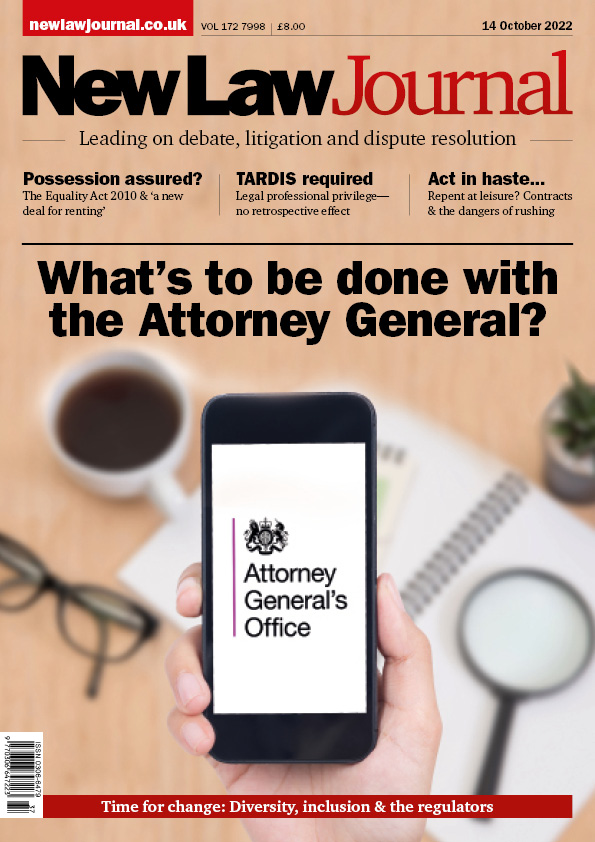THIS ISSUE

It’s rough justice for road traffic claimants under the protocol, writes former district judge Stephen Gold in this week’s 'Civil Way'.
Are Equality Act 2010 defences against eviction likely to remain in place once the government has completed its proposed reforms to assured shorthold tenancy grounds for possession?
Something has to be done to address the over-politicisation of the government’s legal advice, says Roger Smith
Caroline Bowden offers tools & insight to help family law professionals speak with children
Possession assured? Kavish Shah and Edward Peters consider changes in claims against ASTs and secure tenants
Can documents retrospectively acquire legal professional privilege? Not without a time machine, says Ian Smith in this month’s brief
Nicholas Dobson reports on the balancing act between housing supply & need, in an eviction case
RTA protocol transfers get easier; Social services which don’t care; Delay matrimonial transfers?; Basic and special account rises
Jeremy Lederman presents a useful contracts checklist and warns of the perils of rushing
MOVERS & SHAKERS

Jackson Lees Group—Jannina Barker, Laura Beattie & Catherine McCrindle
Firm promotes senior associate and team leader as wills, trusts and probate team expands

Asserson—Michael Francos-Downs
Manchester real estate finance practice welcomes legal director

McCarthy Denning—Harvey Knight & Martin Sandler
Financial services and regulatory offering boosted by partner hires
NEWS
The cab-rank rule remains a bulwark of the rule of law, yet lawyers are increasingly judged by their clients’ causes. Writing in NLJ this week, Ian McDougall, president of the LexisNexis Rule of Law Foundation, warns that conflating representation with endorsement is a ‘clear and present danger’
Holiday lets may promise easy returns, but restrictive covenants can swiftly scupper plans. Writing in NLJ this week, Andrew Francis of Serle Court recounts how covenants limiting use to a ‘private dwelling house’ or ‘private residence’ have repeatedly defeated short-term letting schemes
Artificial intelligence (AI) is already embedded in the civil courts, but regulation lags behind practice. Writing in NLJ this week, Ben Roe of Baker McKenzie charts a landscape where AI assists with transcription, case management and document handling, yet raises acute concerns over evidence, advocacy and even judgment-writing
The Supreme Court has drawn a firm line under branding creativity in regulated markets. In Dairy UK Ltd v Oatly AB, it ruled that Oatly’s ‘post-milk generation’ trade mark unlawfully deployed a protected dairy designation. In NLJ this week, Asima Rana of DWF explains that the court prioritised ‘regulatory clarity over creative branding choices’, holding that ‘designation’ extends beyond product names to marketing slogans
From cat fouling to Part 36 brinkmanship, the latest 'Civil way' round-up is a reminder that procedural skirmishes can have sharp teeth. NLJ columnist Stephen Gold ranges across recent decisions with his customary wit







